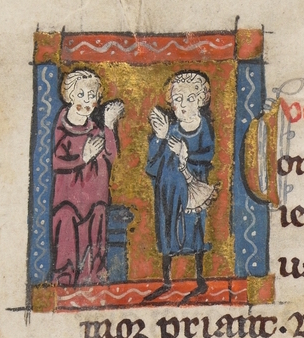The jeu-parti is a lyric poem in which two individuals who usually name each other at the beginning of each stanza debate a ‘would you rather’-style question: would you rather see your lady naked from the waist up or from the waist down? would you rather have a husband who is great at jousting but is always away at tournaments or one who stays at home with you but is rubbish at a tourney? And so on. Some of the questions are racy, some silly, some fairly courtly, but the jeu-parti stages a medieval precursor of the rap battle for two poet-composers to thrash it out, complete with insults, ribbing, and boasting.
Less formally, the demande d’amour is, literally a Love Question, often similar to the sorts of dilemmas in the jeux-partis, but which is posed in prose and rather simpler in format. It clearly amused courtiers who wanted to play the game themselves rather than merely listen to two performers singing about it.
It has been assumed that the informal prose practice of Love Questions pre-dated the more formal practice of the jeu-parti, but the sources for the former are almost all later than the latter — with one exception: the Bodleian library manuscript Douce 308, which I’ve been working on for years now, has the oldest collection of Love Questions and some of the latest collections of jeux-partis. In this article, I examine what these can tell us about the relationship between these two kinds of courtly entertainment.
The lovely people at OUP have given me a link that I can post here on my blog which should take you to a free version of the text. The full reference is:
